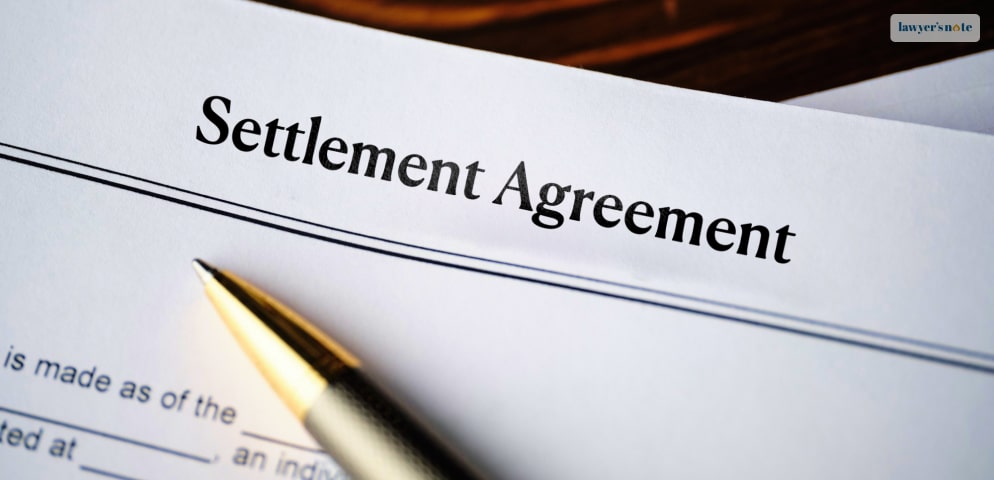Bus Accident Attorneys: Essential Tips for Victim Representation
As bus accident attorneys, we have undergone a series of bitter experiences with the victims that are quite horrifying. After....
1328 Views

When people are involved in a legal fight, it can take a lot of time and money. So, it’s usually better for everyone if they can find a fair solution that works for both sides. This is where a settlement agreement comes in. It can happen at any point during the legal process, and the terms are decided by all parties involved.
Can you negotiate the terms of a settlement agreement?
What happens if you are in breach of such an agreement?
Can you have a lawyer review the agreement?
Do you have to pay taxes for a settlement agreement?
Is an agreement of settlement better than going to trial?
A settlement agreement can be as simple as a verbal agreement, but it’s a good idea to write it down to avoid confusion later on. Having a written agreement ensures that all the details are clear, and if needed, it can be used as evidence of the agreement in the future. This helps everyone involved know exactly what they agreed to, and it can bring the dispute to an end without the need for a costly and time-consuming trial.
In this article, we will answer all your questions regarding agreements of settlement and make sure you have smooth sailing in getting yours!

Let us look at the legal and formal definition of an agreement of settlement.
According to the Department of Justice of the United States, “When the Department identifies a violation of federal law,” a “resolution that avoids litigation” is often the easier and quicker way out.
“A resolution can take the form of a settlement agreement or consent decree.” A consent decree, also called an agreement of settlement, requires careful judicial review. Often “monitors are used to provide technical assistance and assess compliance with a settlement.”
It’s possible to negotiate debt settlement on your own and come to an agreement for less than you originally owed. All you have to do is know a few common legal jargon which I have discussed in the next section of this article.
An agreement of settlement is a legally binding agreement between two or more parties to resolve a dispute or conflict without going to court. In practical terms, it’s like a compromise or a deal that helps avoid the time, cost, and uncertainty of a trial.
When people are in a disagreement, they can negotiate and agree on specific terms in the agreement to reach a resolution. This can include things like payment of money, exchange of property, promises not to do certain things or any other terms that will settle the dispute.
Once all parties agree on the terms, they sign the settlement agreement, making it a legal contract. This means that all parties must follow the terms they agreed upon, and if any party fails to do so, the other party can enforce the agreement in court.
These agreements can be used in various situations, such as personal injury cases, employment disputes, business conflicts, and more. They can be beneficial because they offer a quicker and less expensive way to resolve disputes, and they allow the parties involved to have more control over the outcome.

It is a contract that helps people find a compromise and avoid a lengthy legal battle. Here is what a standard agreement of settlement looks like.
The agreement starts with an introduction stating the parties’ names, the date, and a brief overview of the dispute.
This section provides some background information about the dispute and the reasons why the parties want to settle. It helps set the context for the agreement.
This is the heart of the agreement, where the actual terms and conditions of the settlement are laid out. Each point is usually numbered for clarity.
If money or something of value is being exchanged as part of the settlement, this section will specify the amount and the method of payment.
Release of Parties or Terms of Waiver.
Parties agree to release each other from any further claims related to the dispute. This means they can’t come back later and sue each other for the same matter.
Often, these agreements include a clause that requires parties to keep the terms of the settlement confidential, so they can’t disclose it to others.
Sometimes, the agreement includes a provision prohibiting parties from saying negative things about each other.
This section states that the settlement doesn’t mean any party admits fault or liability for the dispute. It’s a way to avoid accepting blame.
This clause ensures that if one part of the agreement is considered invalid or unenforceable, the rest of the agreement still stands.
Parties agree on which state’s laws will govern the agreement. It’s usually the state where the agreement is signed.
his section says that the written settlement agreement represents the entire deal between the parties and supersedes any previous discussions or agreements.
It states that any changes to the agreement must be made in writing and signed by all parties.
The parties and their representatives sign the agreement to show their acceptance and commitment to abide by its terms.
The agreement becomes legally binding on the effective date, which is the date when all parties have signed it.
Some jurisdictions may require a witness to sign the agreement as proof of its authenticity.
The agreement might specify the circumstances under which it can be terminated or voided.
If the agreement involves companies or organizations, this section may explain how the terms apply to their successors or assigns.

Negotiating a settlement agreement with the help of a lawyer can be important if you’re dealing with a legal problem and want to find a way to resolve it without going to court. So, what can one do?
First, find a good lawyer who knows about the type of problem you have. Talk to them about your situation, what rights you have, and how you can fix the issue.
Your lawyer will look at all the evidence and documents related to your case. They’ll figure out how strong your position is and what problems might come up.
Work with your lawyer to decide what you really want to get out of the settlement. Maybe it’s money, an apology, or some other action. Knowing this will help your lawyer negotiate better.
Your lawyer will help you write a clear and straightforward proposal. This will explain what you want in a way that makes sense to the other side.
Your lawyer will talk to the other party or their lawyer for you. They’ll show them your proposal and try to start a conversation about settling the problem.
Be prepared for the other side to suggest different ideas. This is called a counteroffer. Your lawyer will discuss these offers with you and help you decide whether they are good for you.
Sometimes, there are creative solutions that can help both sides. Your lawyer will help you think about other options that might work for everyone.
Negotiations can be stressful, but staying calm and focused is important. Your lawyer will help you stay level-headed so you can make good decisions.
Make sure that everything you talk about during the negotiations is written down. This way, everyone knows what was agreed upon.
Your lawyer will create a settlement agreement once you and the other party agree on the terms. They’ll review it with you to ensure it says what you both wanted.
A settlement agreement is like a promise, and it’s legally binding. Your lawyer will make sure it follows all the legal rules and can be enforced if needed.
After the agreement is signed, both sides need to do what they promised. Your lawyer will help you make sure everything is done as agreed.
Negotiating a settlement agreement might not be easy, but having a lawyer by your side makes it much smoother.

If you break a settlement agreement, it means you didn’t do what you promised in the agreement. This can lead to serious problems, but having a lawyer can help you handle the situation better.
First, your lawyer will check if you’ve done everything you agreed to in the settlement agreement. If you haven’t, it’s considered a breach.
Your lawyer will gather proof to understand the situation better. This evidence will be used to support your case and show any reasons that may explain the breach.
Your lawyer will explain what could happen if you breach the agreement. It might lead to penalties or the other party taking legal action against you.
Your lawyer will communicate with the other side or their lawyer to discuss the breach. This communication can help find a solution without going to court.
If the breach is minor and unintentional, your lawyer can negotiate with the other party to find a way to make things right. This might involve doing something extra or offering compensation.
Sometimes, it’s helpful to try mediation or alternative dispute resolution to resolve the breach peacefully. Your lawyer can represent you during these discussions.

When you receive money from a settlement agreement, you might wonder if you need to pay taxes on it. The answer depends on what the settlement is for and the specific laws in your area.
Whether you have to pay taxes on the settlement depends on the reason you got the money. If it’s compensating you for harm or loss, it can be taxable. But if it’s meant to punish the other party, like punitive damages, it is always taxable.
If the settlement is meant for a physical injury or sickness, a part of the money might be tax-free. This may be the case for compensatory settlements awarded for physical harm and emotional distress.
Usually, settlements for emotional distress are taxable.
Settlements that make up for lost wages or back pay are usually taxable as regular income.
Punitive damages are usually taxable because they’re meant to punish the other party, not compensate you for a specific loss.
Any interest included in the settlement amount is usually taxable as regular income.
The tax treatment of attorney’s fees can vary depending on where you live. In some cases, they may be tax-deductible, but in others, they could be considered taxable income for you.
Some settlements have provisions for tax deductions. This is the case if they’re related to business expenses or investment losses.

Settlement agreements are usually better than going to trial for several reasons.
Settling a dispute is faster and cheaper than going through a long court trial. It helps you avoid high legal fees and saves you months or even years of waiting.
With a settlement, you know what you’ll get, unlike trials where the result is uncertain. It gives you peace of mind and avoids any surprises.
Settlements are private, so the details stay between the involved parties. Trials are public, and everyone can know about your case.
Settlements can be customized to fit your specific needs. In contrast, court decisions follow standard rules that may not be the best fit for your situation. Settling gives you a chance to be part of the decision-making process and find common ground.
Read More:

As bus accident attorneys, we have undergone a series of bitter experiences with the victims that are quite horrifying. After....

It’s important to keep a steady and ironclad relationship with your suppliers. It helps you to reach your business in....
By LawyersNote
08 May 2024
One of the significant challenges in the legal field is the matter that requires proving legal malpractice. Proving a legal....
By LawyersNote
08 May 2024